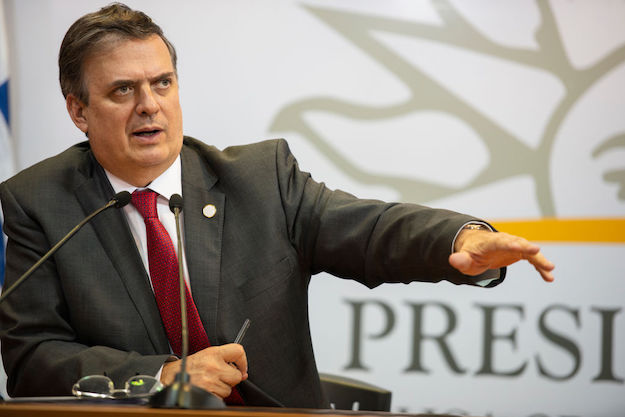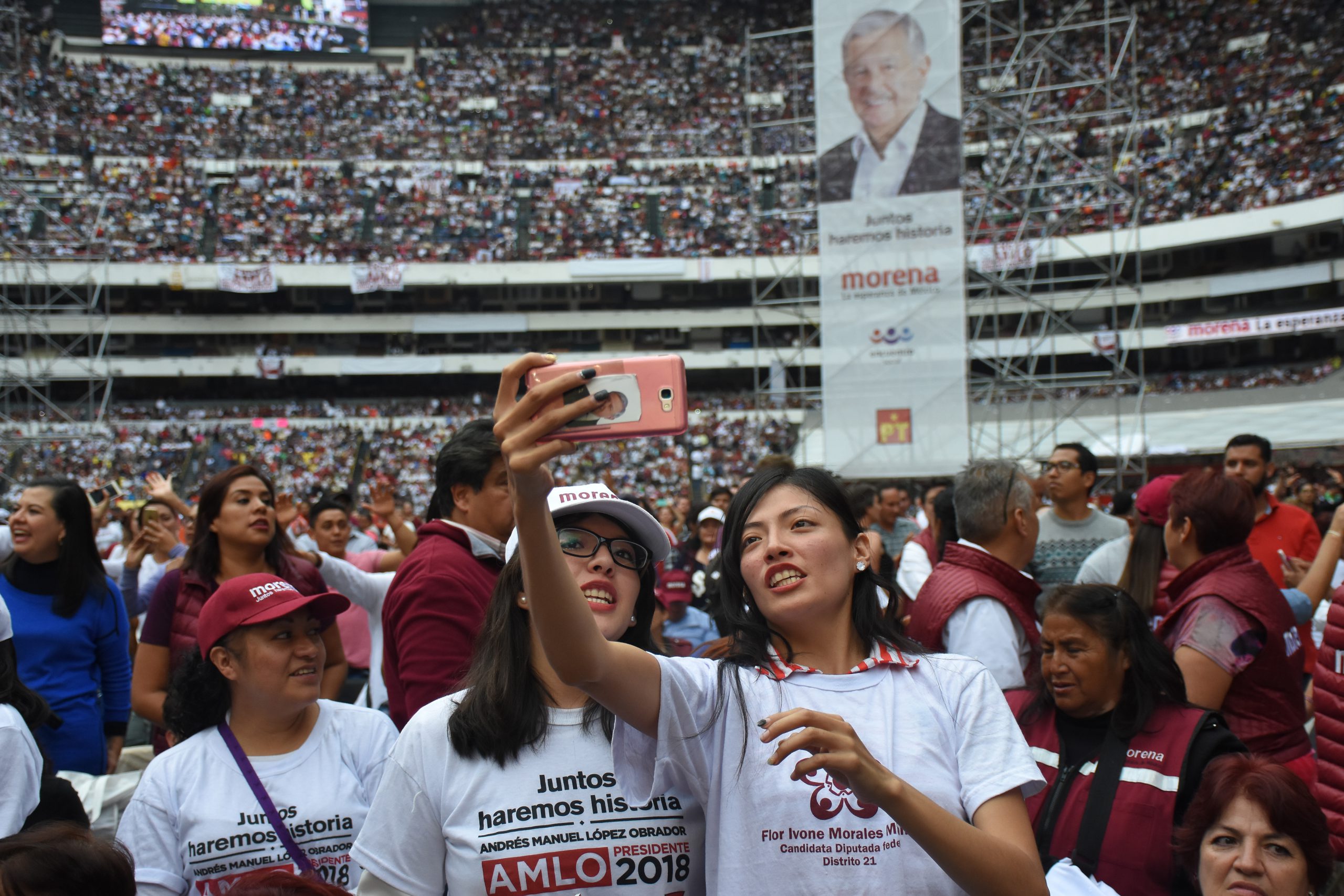For María Ghersi, in solidarity.
The humanitarian crisis taking place in Venezuela is unparalleled in Latin America and perhaps the world. Clinging to power, President Nicolás Maduro has undermined freedoms, bullied and imprisoned his opponents, and sent millions of Venezuelans into exile or in search of political asylum. He and his regime have become more isolated from the international community by the day.
But there is some confusion as to what role Mexico should play in this crisis. For many, Andrés Manuel López Obrador’s ambiguous position – by turns neutral and by others seeming complicit in allowing the regime to remain – is unpardonable. Mexico clearly does not support Maduro, but nor does it support a coup d’état to unseat him, and much less an armed invasion backed by the U.S.
To understand López Obrador’s position – and how it might evolve – one first has to understand the role Venezuela has played in Mexico’s domestic politics over the last two decades. That begins with the reminder that Maduro is not Hugo Chávez.
Under Chávez, Venezuela saw a 20 percent reduction in poverty between 1999 and 2012, the year it enjoyed the sharpest drop (5.6 percent) of any Latin American nation, according to CEPAL. In that period, the chavista program tackled inequality and UNESCO decreed Venezuela free from illiteracy. This real social progress, along with political and personal charisma, gave Chávez approval rates above 50 percent throughout his 14 years as president. In that time he won 13 of the 14 electoral tests he faced, and he did it with international observers watching.
Maduro has rapidly destroyed that legacy. In presidential elections in 2013, he won by just 1.5 percent against Henrique Capriles. In 2018 he won by more than 47 percent, but in elections lacking legitimacy or a level playing field. Maduro now leads an authoritarian regime, with an unsustainable hold on power.
The question now facing the international community is less about whether Maduro should go than it is about how. It is here that López Obrador has found himself at odds with other international players. But in truth, Mexico has never really known what to do about Venezuela. From former presidents Vicente Fox, Felipe Calderón, Enrique Peña Nieto and now López Obrador, the only common thread in Mexico’s position is that it has been dictated by internal politics.
Familiar Pattern
Mexico’s democratic transition in 2000 meant a shift in its foreign policy. Fox and his first foreign minister, Jorge Castañeda, took the view that Mexico should assume new global commitments, including the active promotion of human rights abroad.
During the first three years of Fox’s term, Mexico began to speak up about abuses in Cuba, cooling the special relationship it had enjoyed with the Castros for decades. That, in turn, strained Mexico’s relationship with Venezuela. In November 2005, Chávez called Fox a “puppy of the empire.” Both countries withdrew their ambassadors.
Chávez, though, was wrong. In fact, Mexico distanced itself strongly from the United States under Fox’s watch, particularly following then-President George W. Bush’s interventionist adventure in Iraq. Mexico risked tension with the U.S. by joining France in condemning the invasion in the UN Security Council. Again, the rationale for the position – this time in alignment with Chávez’s opposition to the U.S. – was based on efforts to forge a new identify for Mexico on the world stage.
By contrast, Fox’s successor Felipe Calderón did everything possible to normalize Mexico’s relationship with Cuba and Venezuela. This despite the fact that Chávez had been fodder for Calderón’s campaign for the presidency in 2006, which used Chávez’s image to stir fears that López Obrador, if elected, would be “a danger to Mexico.”
Calderón ended up beating López Obrador by less than 0.56 percent of the vote in an election tarnished by multiple irregularities. Once in office, Calderón’s position toward Chávez changed. By August 2007, both countries had returned their ambassadors and Chávez recognized Calderón as president. The face of the Latin American left ceased to be a thorn in Calderon’s side, and kept quiet as Calderón steered Mexico into a war on drug cartels that would have its own grave implications for human rights. In other words, Venezuela never really mattered to Calderón – what he cared about was not having to deal with Chávez as an adversary.
Mexico’s Venezuela policy took another turn when Enrique Peña Nieto won the presidency in 2012 and set off on a reform campaign that shook up everything from energy to education. Foreign policy was no exception, particularly in the case of Venezuela. Peña Nieto began to push against Maduro in earnest in 2016, when then-Foreign Minister Claudia Ruiz Massieu hosted Venezuelan opposition figure Lilian Tintori in Mexico City. Luis Videgaray, Peña Nieto’s third and final foreign minister, hardened Mexico’s position, even taking a leading role in shaping the OAS’ approach toward Caracas.
With Videgaray, Mexico’s primary foreign policy objective was to navigate the bilateral commercial relationship with the U.S. and a then-newly elected President Donald Trump. Given Mexican public opinion, Peña Nieto had no choice but to forcefully reject Trump’s wall proposal. But on immigration and especially on Venezuela, Mexico tried to be accommodating. Videgaray was determined to get along with Trump.
In sum, Mexican policy toward Venezuela has always been guided by internal politics. With Fox, that meant confrontation based on a new interpretation of Mexican foreign policy; with Calderón, it was a hypocritical instrument to shore up internal legitimacy; and with Peña Nieto, a way to appease the U.S. This is the context in which López Obrador and his foreign minister, Marcelo Ebrard, entered office, just as Venezuela’s crisis reached a breaking point.
AMLO and Ebrard
In all three of his campaigns for the presidency (2006, 2012, 2018), López Obrador’s opponents have claimed he would lead Mexico “down the path of Venezuela.” That is partly why many of us expected AMLO to continue to pursue Peña Nieto’s stance against the Maduro regime. Venezuela’s crisis deserves condemnation, and it seemed that the most logical position for López Obrador to take would be to join calls for new elections. The need for a leftist government to denounce human rights abuses is especially true when those abuses are committed by another government of the left. It therefore seemed likely that Ebrard would continue support for the Lima Group and join the OAS in ratcheting up its crticism of Maduro. That’s not what happened.
Instead, in just over two months in office, Ebrard and López Obrador have revived a conservative interpretation of two key principles of Mexican foreign policy. Namely, that Mexico will not get involved in the internal and sovereign matters of other countries, and that it will not recognize or disavow a foreign government. The Carranza and Estrada doctrines have returned to the center of Mexican diplomacy.
AMLO’s government has thus tried to open dialogue between Maduro and the Venezuelan opposition. Mexico signed on to the so-called Montevideo Mechanism, together with Uruguay, endorsing the search for a peaceful solution to the crisis. From a Mexican perspective – in particular as it pertains to public opinion – AMLO’s position makes sense, taking into account both the history of U.S. intervention in Latin America and profound political change in the region. The recent wave of leftist governments in South America has subsided. Today, Latin America’s biggest economies are largely dominated by rightest governments, leaving Mexico – by virtue of its size, global weight and AMLO’s popular mandate – as the most important ideological counterweight in the region.
But here, too, AMLO has followed the pattern of previous administrations, fashioning his response to Venezuela in the context of domestic realities. Mexico’s 2018 election pulverized the opposition and produced a profound change in the traditional party system that has yet to fully settle. Calderón is now trying to present himself as AMLO’s primary opposition. That helps explain the former president’s renewed concern for human rights in Venezuela, as he relives the battles he’s had with AMLO over the last 16 years. All politics is local, after all. (Mexico’s former ambassador to the U.S. has written about Trump’s own domestic political interests in Venezuela.)
Today, AMLO’s position is one of resistance to forced regime change or military intervention in Venezuela. He has so far ignored Trump and other U.S. foreign policy hawks – as well as Jair Bolsonaro in Brazil, Mauricio Macri in Argentina and Iván Duque in Colombia – in their calls to recognize Juan Guaidó as Venezuela’s president and call immediately for new elections.
But with violence and shortages in Venezuela mounting, there is question as to how long AMLO can keep it up. Few actors in this conflict have based their positions on the international principle of the responsibility to protect. Internal politics rule the day, and the U.S. can still exert significant pressure on the Mexican administration. U.S. economic support is vital to Ebrard’s vision of development in Central America, for example. Meanwhile, backing on the Venezuela issue has grown in importance for Trump and his team. Trump also holds the cards on immigration and when it comes to ratifying the USMCA.
Mexico’s position could therefore change quickly, especially as Uruguay, in addition to backing the Montevideo Mechanism, has given its support to the Contact Group, another multi-lateral initiative to deal with the Venezuelan crisis, led by the EU and numerous Latin American countries. Mexico finds itself increasingly alone.
What Way Forward?
Since 2012, I’ve listened intently to opposition figures like Leopoldo López and opposition congressmen and mayors that I’ve interviewed as Venezuela’s crisis has worsened. Their pain – and Venezuela’s struggle – is known in Mexico. One need only look at the number of political asylum requests Mexico has received from Venezuela – rising from just one in 2013 to over 4,000 in 2017, according to the Mexican Commission of Refugee Assistance (COMAR). That number was surely even higher in 2018.
In the end, López Obrador’s administration seems likely to move toward the consensus that Maduro is indefensible and needs to go. Ebrard recently clarified that Mexico “doesn’t defend Maduro or his regime.” Mexico in effect is doing what all countries in the conflict have done: taking a look at internal politics and adjusting its foreign policy accordingly.
Meanwhile, López Obrador may well revive a generous asylum policy that Mexico has offered in the past and accept asylum requests from thousands of Venezuelans. That may be a more helpful step than recognizing Guaidó or disavowing Maduro, and one that the diverse faces of the Mexican left should be willing to support.
Mexico has taken many different approaches to Venezuela over the years. Perhaps the time has come to settle on one. There is no doubt that Maduro has to go, the difference between Mexico and the rest, for now, lies in how it should happen.









